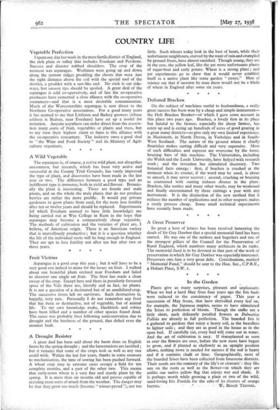A Drought Resister A great deal has been said about
the harm done on English farms by the spring drought; and the lamentations are justified; but it remains that some of the crops look as well as any one could wish. Within the last few years, thanks in some measure to mechanisation,' the time of sowing has been pushed forward. A wheat crop may in extreme cases occupy a field for ten complete months, and a part of the other two. This means that early-sown wheat is a very fine' and sturdy plant by the spring. It is more than six months old and proves capable of resisting most sorts of attack from the weather. The danger may be that they grow too much (become " winter-proud "), not too little. Such wheats today look in the best of heart, while their unfortunate neighbours, starved by the want of rain and crumpled by ground frosts, have almost vanished. Though young, they are in the sere, the yellow leaf, like the yet more unfortunate plants of sugar-beet and early potato. Wheat is a strong plant ; and yet experiments go to show that it would never establish itself as a native plant like some garden "strays." Men of science say that if unsown by man there would not be a blade a wheat in England after some six years.
* * * *


















































 Previous page
Previous page